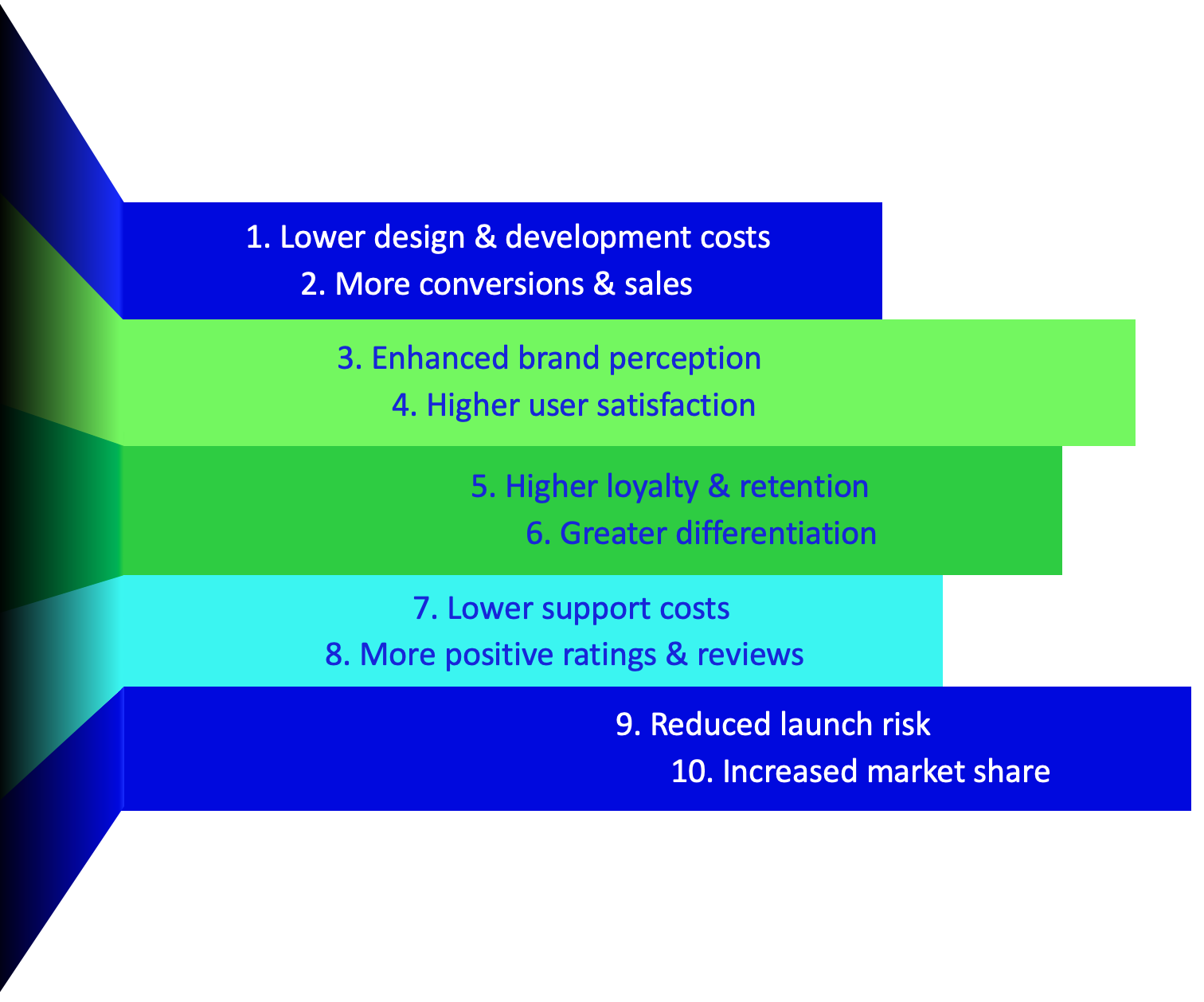INSIGHTS RECOMMENDATIONS OUTCOMES
We take the guesswork out of creating fantastic experiences by leveraging research to solve product and design problems.
We take the guesswork out of creating fantastic experiences by leveraging research to solve product and design problems.

We know that the most successful organizations on earth have figured out that it makes a lot of sense to embrace UX Research, because we’ve helped them do it. By blending the arts of consulting and knowledge elicitation with the sciences of psychology, biometrics and human behavior, we can help you evaluate and improve UX in ways you probably can’t do alone.


 Let's face it. This rapidly expanding and highly cross-functional field, known as User Experience, often loses its roots in the fast-paced business world of aggressive timelines and trendy buzzwords. Many product teams are just talking about their users in corporate echo-chambers and blindly designing things based on vanity metrics masqueraded as quantitative research. They are failing to adhere to the core tenant of UX: "know thy user(s)." They are forgetting that it's usually far more insightful to learn about their users through direct observation vs. other so-called "research" methods. All the jargon and questionably-collected data in the world won't tell them what they really need to know about the UX they are responsible for delivering. This is why we focus on bringing only the most effective research methods to bear on solving their UX challenges. This is why we do what we do: UX isn't UX without research and we know how to do it right.
Let's face it. This rapidly expanding and highly cross-functional field, known as User Experience, often loses its roots in the fast-paced business world of aggressive timelines and trendy buzzwords. Many product teams are just talking about their users in corporate echo-chambers and blindly designing things based on vanity metrics masqueraded as quantitative research. They are failing to adhere to the core tenant of UX: "know thy user(s)." They are forgetting that it's usually far more insightful to learn about their users through direct observation vs. other so-called "research" methods. All the jargon and questionably-collected data in the world won't tell them what they really need to know about the UX they are responsible for delivering. This is why we focus on bringing only the most effective research methods to bear on solving their UX challenges. This is why we do what we do: UX isn't UX without research and we know how to do it right.
Before going forward, let's establish some key definitions so we're all on the same page. Let's start with these:
User: The person interacting with a product, system, or service.
User Experience (UX): UX refers to what people think and do when interacting with a product, system, or service.
UX Research: The systematic investigation of User Experience to uncover opportunities for improvement and to inform design direction.
UX Testing: A research method characterized by the observation of users while they interact with a product, system, or service (or a prototype thereof).
The value of a superb User Experience (UX) is undeniable, from higher satisfaction, fewer "user errors," increased productivity and lower redesign costs to superior brand perception. But getting it right isn’t easy and product teams often lack the clear and actionable, unbiased, observation-based insights that UX Research provides. That’s where we come in.
The UXology Group is 100% focused on providing product teams like yours with the insights that lead to more user-friendly products, systems, and services. Whether you want us to conduct exploratory research to uncover foundational user needs before building anything, are mid-flight through an aggressive development timeline, or have already launched, we will provide the correct research services for your situation.

In our upended new world, gripped by the Covid-19/Corona Virus Pandemic, social distancing and other preventive measures against infection have quickly become the norm. The UXology Group is making every effort to comply with and support safe preventive practices, as defined by the experts in the scientific, medical and governmental communities. In response to the current situation, in order to assist severely challenged businesses, The UXology Group is providing a 15% discount on our Remote UX Testing program. This regimen supports highly effective, contactless research sessions, for both participants and researchers, who need not be located in the same room, or even the same country. All contact is digital and remote. At this time of unprecedented upheaval and uncertainty, one of the most important positive and constructive actions that businesses can take, in order to rebuild and survive this Pandemic and pave the way for a positive future is to reopen and start operating again. The UXology Group is fully prepared to assist with your critical UX Research needs as you carefully consider the best ways to realign your products, systems and services in order to provide the best possible User Experience to your clients and users. Please contact us if you have any questions or we can be of assistance.
If in-person research methodologies are absolutely required for a given project, we can make arrangements to have any UX Researchers and participants tested for Covid-19 within 24 hours of an in-person session. Further, we will enforce a mask at all times policy as well as expedite the entire process as much as possible, without adversely affecting the results. The UXology Group is obviously in no position to predict, guarantee or affect any particular outcome or danger level of Covid-19 testing and/or any precautionary measures employed to protect against contracting the disease, however, we will take every reasonably available precaution to prevent such an occurrence.


How can we solve these issues?

 Quantifying the return-on-investment ("ROI") for UX, as with the overlapping fields of market research, customer experience, and design, is a complex and 100% contextual problem. It's possible to numerically measure the impact of UX Research in some cases, such as for digital products with highly granular analytics, but even those cases are rife with practical limitations and significantly lacking in scientific validity. As with everything in business, and in life, your results will vary. Every company and business problem is unique. That being said, there are patterns, and it's hard to argue with the qualitative benefits of identifying UX issues early and often, so that your organization can fix them to improve User Experience.
Quantifying the return-on-investment ("ROI") for UX, as with the overlapping fields of market research, customer experience, and design, is a complex and 100% contextual problem. It's possible to numerically measure the impact of UX Research in some cases, such as for digital products with highly granular analytics, but even those cases are rife with practical limitations and significantly lacking in scientific validity. As with everything in business, and in life, your results will vary. Every company and business problem is unique. That being said, there are patterns, and it's hard to argue with the qualitative benefits of identifying UX issues early and often, so that your organization can fix them to improve User Experience.


Remote UX testing is a simple, effective, and efficient way to evaluate digital products such as websites and software. The goal of these projects is to evaluate UX by observing what people think, say, and do while interacting with your digital product under the watchful eye of a professional researcher. Typically, seven to ten participants are involved in qualitative UX tests and more users may be involved for studies needing quantitative data too.
First, we host a remote kickoff meeting with you. In this call, we walk through the project objectives, approach, and timeline with your team to ensure alignment and understanding. After that, we will ask your team to demonstrate the product we'll be testing. We'll also put together a Research Outline & Moderator Guide, which describe how the test is structured, for your feedback and review. Once finalized, these documents will be used to drive the collection of data during testing.
Second, we start the recruiting process. This begins with creation of a screener, which contains all the criteria we need to find your target users for testing. After finalizing the screener, with inputs from your team, we'll use those demographic, behavioral, and attitudinal characteristics to find participants for the test.
The process of recruiting can take many forms. However, we'll typically tap our top-notch trusted network of agencies, which specialize in research recruiting, to find the right people to participate. Once identified and recruited, we will schedule each participant for their session and make sure they are ready for it.
Third, we facilitate a series of interviews with the participants we recruited, often over one or two days, in what is also known as a qualitative user/usability test. This is an enlightening, data-rich experience because observation is the most powerful form of research. Audio, video, and screen sharing are leveraged over a web conference so your team can watch the sessions live from anywhere. Sessions are also recorded so we can create video highlights for you that illustrate key findings.
Testing is facilitated by an expert moderator who knows how to elicit candid feedback from each participant. This moderator is supported by a team of usability professionals who leverage principles of design, psychology, and human behavior to call out issues that are causing UX problems. For instance, we flag design issues and shortcomings that cause ‘user error’, identify sources of confusion, unmet user needs, and otherwise pinpoint problems that trigger frustration, so you know what to fix to create a better experience.
Fourth, we will analyze all the data and present it as valuable insights in the form of written/presented reports. The first report, delivered within 48 hours of data collection, is a high level summary of findings. The second report includes detailed descriptions of UX issues combined with actionable strategic and tactical recommendations for how to improve your product, supported by screenshots, hard-hitting participant quotes, and video highlights (if desired).
Each report is carefully crafted to be straightforward and easily understood by your audience, no matter how diverse or specialized they are. At this point, clients are normally so thrilled with the discoveries that they want ongoing iterative UX testing to stay abreast of the ever-changing needs and expectations of the digital experience. Contact us to find out more!

